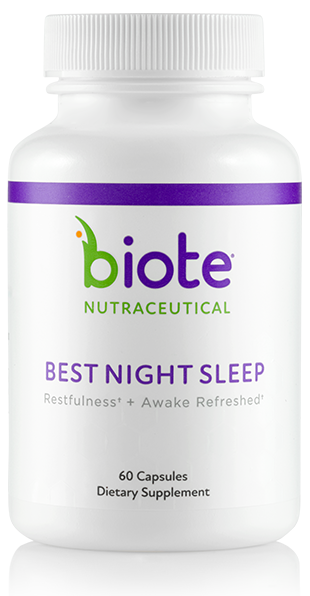Nutrition and Hormone Therapy Like None Other
Backed by 10+ years of data and clinical research, each product has been carefully formulated based on the best scientific discoveries, using the highest quality ingredients available.

The association of sleep with emotions has long been studied. However, not much has been studied about the association of sleep deprivation and sleep debt with the emotion of anger. This article focuses on the association of sleep with anger, and the results suggest that lack of sleep and sleep debt both lead to the emotion of anger.
According to a new study by researchers from Iowa State University, “The effects of sleep on cognitive abilities and overall human health has been of interest in the scientific community for a long time.” Searches in PubMed, Google Scholar, Medline, and newspapers, as well as a general search, were conducted, and of the 63,219 articles that contained relevant information, 17 were selected for review.
Significantly, the researchers indicated that, “Sleep deprivation can exacerbate pre-existing mood disturbances, such as anger, depression, and anxiety, and can lead to confusion, fatigue, and lack of vigor. Even just one sleepless night correlates with these changes in function.”
Saghir Z, Syeda JN, Muhammad AS, Balla Abdalla TH. The Amygdala, Sleep Debt, Sleep Deprivation, and the Emotion of Anger: A Possible Connection?. Cureus. 2018;10(7):e2912. Published 2018 Jul 2. doi:10.7759/cureus.2912
Results of a 9-year study of a national sample of 991 middle-age and older US adults revealed that a positive attitude was associated with less memory decline.
According to the study, published in the journal Psychological Science, associations between feeling enthusiastic, attentive, proud, active, and immediate and delayed memory recall, “revealed that positive affect was associated with less memory decline across 9 years when analyses controlled for age, gender, education, depression, negative affect, and extraversion.”
Hittner EF, Stephens JE, Turiano NA, Gerstorf D, Lachman ME, Haase CM. Positive Affect Is Associated With Less Memory Decline: Evidence From a 9-Year Longitudinal Study. Psychological Science. 2020;31(11):1386-1395. doi: 10.1177/0956797620953883
Gastrointestinal (GI) distress and permeability (leaky gut syndrome) has increased due, in large part, to the excessive consumption of highly processed, calorie dense, commercially available foods. Over-the-counter probiotics, often purchased to help with symptoms of GI distress, don’t deliver consistent results, do not survive stomach acid, and never reach the small intestine.
This study of 28,238 adults between the ages of 45-85 concluded that being alone and isolated may have a negative effect on heart health, especially middle and older-aged women.
The results, just now published in the Journal of Hypertension, revealed that the odds of hypertension (high blood pressure) were higher among widowed women compared with married women. For men, however, living alone was linked to lower odds of hypertension.
The study concluded that, “Social ties appear to be more strongly associated with hypertension in middle and older aged women than men. Women who are non-partnered or who engage in few social activities and men who are coliving represent at-risk groups for having hypertension.”
Hosseini, Zeinaba,b; Veenstra, Gerryc; Khan, Nadia A.d,e; Conklin, Annalijn I.a,e Social connections and hypertension in women and men, Journal of Hypertension: October 22, 2020 – Volume Publish Ahead of Print – Issue – doi: 10.1097/HJH.0000000000002688
Teddy Roosevelt’s solution to feeling down was: Get action. Good news! It doesn’t have to be intense. Improving mood and feeling blue are often lifted by doing something people “want to” and enjoy.
Published in the journal, World Psychiatry, the results of a meta-analysis of randomized controlled groups in adults aged 55-80 found that, “exercise was associated with enhanced cognitive functioning, especially for tasks involving more complex executive functioning…and the most active groups showed a 28% risk reduction for dementia and 45% risk reduction for Alzheimer’s disease compared to the least active.“
“To sum up, physical activity is a major health behaviour strongly recommended for the prevention and treatment of several non‐communicable diseases. The behaviour itself is multi‐faceted and may comprise less sitting, more light‐ intensity activity, as well as traditional moderate-to-vigorous physical activity (MVPA). The evidence concerning mental health effects is extensive, but still growing.
Biddle S. Physical activity and mental health: evidence is growing. World Psychiatry. 2016;15(2):176-177. doi:10.1002/wps.20331
A review of studies conducted with Omega-3 fatty acids revealed that they may have an important role in keeping the brain sharper, longer.
Long-chain omega-3 fatty acids are essential for normal brain development, and could have neuroprotective properties against dementia. The study review indicated that, “In summary, the existing data favor a role for long-chain omega-3 fatty acids in slowing cognitive decline in elderly individuals without dementia, but not for the prevention or treatment of dementia…” Biological studies suggest that omega-3 fatty acids, “have a role in primary prevention of cognitive decline by improving blood flow, decreasing inflammation, and/or reducing amyloid-B (plaque deposits in the brain).”
Fotuhi, M., Mohassel, P. & Yaffe, K. Fish consumption, long-chain omega-3 fatty acids and risk of cognitive decline or Alzheimer disease: a complex association. Nat Rev Neurol 5, 140–152 (2009). https://doi.org/10.1038/ncpneuro1044
The potent flavonoid, fisetin, may produce significant results for healthier ageing.
This study identified the flavonoid fisetin as having a greater ability to positively effect cell aging, age-related changes in tissues caused by disease, disease markers, health span, and lifespan. Older, aging mice were administered fisetin, and the results revealed that fisetin restored tissue homeostasis, reduced age-related pathology, and extended medium and maximum lifespan.
The study concluded that, “The natural product fisetin has senotherapeutic activity in mice and in human tissues. Late life intervention was sufficient to yield a potent health benefit. These characteristics suggest the feasibility to translate to human clinical studies.”
Matthew J. Yousefzadeh, Yi Zhu, Sara J. McGowan, Luise Angelini, Heike Fuhrmann-Stroissnigg, Ming Xu, Yuan Yuan Ling, Kendra I. Melos, Tamar Pirtskhalava, Christina L. Inman, Collin McGuckian, Erin A. Wade, Jonathon I. Kato, Diego Grassi, Mark Wentworth, Christin E. Burd, Edgar A. Arriaga, Warren L. Ladiges, Tamara Tchkonia, James L. Kirkland, Paul D. Robbins, Laura J. Niedernhofer, Fisetin is a senotherapeutic that extends health and lifespan, EBioMedicine, Volume 36, 2018, Pages 18-28, ISSN 2352-3964, https://doi.org/10.1016/j.ebiom.2018.09.015.
The results of a recent randomized controlled study, published in the journal, Nutrients, suggests, “there is growing evidence that increased consumption of fruit and vegetables is associated with subjective feelings of vitality, which constitutes feelings of less fatigue, improved mood, and a ‘zest for life.’”
The study consisted of a two-week lead-in, four-week intervention, and two-week washout. Plasma vitamin C and vitality questionnaires (total mood disturbance, fatigue, and well-being) were measured fortnightly. Self-reported sleep quality and physical activity were measured every second day through smartphone surveys.
Participants in the study included 167 people with an average age of 26.5 who consumed two kiwifruit containing approximately 250 mg of vitamin C, a 250 mg tablet of vitamin C, or a placebo daily for 4 weeks.
At the end of the study period, participants in the kiwi group and vitamin C group had increased levels of vitamin C. Participants in the kiwi group saw significant improvements in mood, fatigue, and well-being. Only participants with very low levels of initial vitamin C in the vitamin C group saw significant improvements in fatigue and well-being.
Conner, T.S.; Fletcher, B.D.; Pullar, J.M.; Spencer, E.; Mainvil, L.A.; Vissers, M.C.M. KiwiC for Vitality: Results of a Randomized Placebo-Controlled Trial Testing the Effects of Kiwifruit or Vitamin C Tablets on Vitality in Adults with Low Vitamin C Levels. Nutrients 2020, 12, 2898.
As men and women age, immune systems can become “sleepy” and slower to respond to threats.
The immune system is remarkably flexible and capable of substantial change without compromising an otherwise healthy host.
However, a Meta-Analytic study of over 300 empirical articles, published in the journal, Psychological Bulletin, determined that, “…the flexibility of the immune system can be compromised by age and disease. As humans age, the immune system becomes senescent. As a consequence, older adults are less able to respond to vaccines and mount cellular immune responses, which in turn may contribute to early mortality. The decreased ability of the immune system to respond to stimulation is one indicator of its loss of flexibility.”
Segerstrom SC, Miller GE. Psychological stress and the human immune system: a meta-analytic study of 30 years of inquiry. Psychol Bull. 2004;130(4):601-630. doi:10.1037/0033-2909.130.4.601
A healthy diet with adequate amounts of both macro- and micronutrients is essential, for both decreasing fracture risk and enhancing the healing process after fracture.
The authors of this article, published in the Journal of Osteoporosis, performed a customized, retrospective review of available literature, focusing on bone health, nutrition, and fractures.
The results indicated that, “Insufficient intake of certain vitamins, particularly A and D, and other nutrients, such as calcium, may affect bone health or even the time and degree of bone healing in case of fracture.”
In terms of nutrients, the authors indicated, “Administration of calcium and vitamin D supplements is now the main diet intervention against osteoporosis based on their correlation with decrease in bone loss (associated with advanced age) and reduced risk of fracture.”
“Calcium in combination with vitamin D in dietary supplements is found to reduce the incidence of osteoporotic hip fractures. According to Van der Velde et al., the combined daily administration of calcium and vitamin D in elderly women led to a reduction in all fracture incidence by 30%, including hip fracture. In another study involving 2,686 men and women aged 65–85 years the five-year coadministration of calcium supplements and vitamin D reduced the risk of hip fracture by 33%.”
Karpouzos A, Diamantis E, Farmaki P, Savvanis S, Troupis T. Nutritional Aspects of Bone Health and Fracture Healing. J Osteoporos. 2017;2017:4218472. doi:10.1155/2017/4218472
A new study, published in the journal, Nutrition & Metabolism, suggests that a very low carbohydrate diet may help adults lose visceral adipose tissue and improve blood sugar.
Thirty-four men and women, aged 60-75 years with obesity were randomly placed on a very low carbohydrate diet (VLCD) or a standard carbohydrate-based (CHO)/low-fat diet (LFD) for 8 weeks.
The VLCD group experienced a 3-fold greater loss in visceral adipose tissue, and a greater decrease in thigh intermuscular adipose tissue. The VLCD group also had significantly greater thigh skeletal muscle, and greater increases in insulin sensitivity and HDL cholesterol, and decreases in fasting insulin and triglycerides compared to the LFD group.
They concluded, “Weight loss resulting from consumption of a diet lower in (carbohydrate) CHO and higher in fat may be beneficial for older adults with obesity by depleting adipose tissue depots most strongly implicated in poor metabolic and functional outcomes and by improving insulin sensitivity and the lipid profile.”
Goss, A.M., Gower, B., Soleymani, T. et al. Effects of weight loss during a very low carbohydrate diet on specific adipose tissue depots and insulin sensitivity in older adults with obesity: a randomized clinical trial. Nutr Metab (Lond) 17, 64 (2020). https://doi.org/10.1186/s12986-020-00481-9
Regular physical exercise provides a significant benefit to patients already undergoing treatment for hypothyroidism.
20 hypothyroid patients were included in the study. According to the article, published in Archives of Medicine & Health Sciences, The Official Journal of Yenepoya University, “Research at the University of Gaziantep in Turkey set out to study the effects of exercise on levels of thyroid stimulating hormone (TSH), to see if it would help those with lower TSH levels. The results showed that medium-intensity aerobic exercise, which the study classified as 70% of a person’s maximum heart rate, produced the best results for improving TSH.”
Even gentle exercise such as walking, swimming, or yoga produced a favorable result.
The study concluded, “…every young to middle aged hypothyroid patient should do regular physical exercise to improve his/her thyroid status.”
Bansal Akash, Kaushik Amit, Singh C M, Sharma Vivek, Singh Harminder, The effect of regular physical exercise on the thyroid function of treated hypothyroid patients: An interventional study at a tertiary care center in Bastar region of India, Year : 2015 | Volume: 3 | Issue Number: 2 | Page: 244-246
The human peptide GHK (glycyl-L-histidyl-L-lysine) has multiple biological actions, all of which appear to be health-positive.
A recent article, published in the journal International Journal of Molecular Sciences, revealed that GHK, “…stimulates blood vessel and nerve outgrowth, increases collagen, elastin, and glycosaminoglycan synthesis, as well as supports the function of dermal fibroblasts (biological cells that play a role in wound healing).”
It has been established that GHK helps increase hair growth and thickness, and enlarges hair follicle size.
The article further concludes that, “…GHK is a safe, inexpensive, extensively studied compound that has a wealth of positive and health-promoting effects in many tissues and systems. It has been widely used in anti-aging and cosmetic products in humans for decades without any adverse effects…”
Pickart L, Margolina A. Regenerative and Protective Actions of the GHK-Cu Peptide in the Light of the New Gene Data. Int J Mol Sci. 2018;19(7):1987. Published 2018 Jul 7. doi:10.3390/ijms19071987
Natural aging is genetically determined, however, there are now lots of choices to “erase” time.
Peptides are a very new strategy in cosmetic science. They have a direct effect on collagen metabolism and influence collagen production.
An article, published in frontiers in Chemistry, reviewed several peptides used for cosmetic purposes. “The pentapeptide-18 (Leuphasyl) was reported for the first time in 2015. Both instrumental and volunteer-oriented studies acknowledge its effectiveness in wrinkles reduction.” The authors also noted that a combination of two peptides – Leuphasyl and Argireline – delivered a greater combined effect.
Errante F, Ledwoń P, Latajka R, Rovero P, Papini AM. Cosmeceutical Peptides in the Framework of Sustainable Wellness Economy. Front Chem. 2020;8:572923. Published 2020 Oct 30. doi:10.3389/fchem.2020.572923

